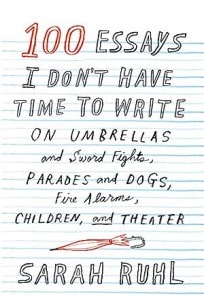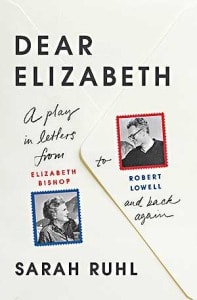 In the midst of writing, Sarah Ruhl is interrupted by her two-year-old son William, who careens into her office with a tearful demand for a fake knife to cut his fake fruit. A bit later, she is halted again mid-sentence, this time with the tender query: “Mom, can I poop here?” When he later types the number 7 on her computer, Mom includes that in her introduction to 100 Essays I Don’t Have Time to Write. And so goes this perceptive, funny, and intimate journal of a mother’s divided life and her quest to balance art and parenthood.
In the midst of writing, Sarah Ruhl is interrupted by her two-year-old son William, who careens into her office with a tearful demand for a fake knife to cut his fake fruit. A bit later, she is halted again mid-sentence, this time with the tender query: “Mom, can I poop here?” When he later types the number 7 on her computer, Mom includes that in her introduction to 100 Essays I Don’t Have Time to Write. And so goes this perceptive, funny, and intimate journal of a mother’s divided life and her quest to balance art and parenthood.
A collection of bite-size servings, 100 Essays reads like an extended, informal interview with one of the most original playwrights of our time. Though she wrote “to preserve for myself, in rare private moments, some liberty of thought,” Ruhl comes to accept that “life intruding on writing was, in fact, life.” The essays, like her plays, bubble up with a sense of wonder, joy and excitement. Divided into sections on writing, acting, viewing and play-making, the slim volume ranges from the significance of Greek masks and colorblind casting to gobos, crickets and Cats. What makes the book compulsory reading for fans and practitioners alike is that, in spite of its fragmentary nature, it presents a surprisingly clear portrait of the author’s worldview.
100 Essays reveals Ruhl to be a true aesthete, a dyed-in-the-wool romantic, and that rarest of creatures: a writer who is both an optimist and an idealist. Whether describing the pleasurable sensation of seeing an umbrella onstage, luxuriating in Shakespeare’s romances and Ovid’s Metamorphoses, or mourning the loss of magic in the theatre, she makes clear her preference for beauty over morality and politics. Lamenting the takeover of American theatre by Apollos, she wonders whatever happened to Dionysians—the irrational, the jugglers and the fire-eaters. She urges dramaturgs to “fight the mania for clarity and help create a mania for beauty instead.” There cannot be many other American playwrights who count as their artistic forebears both Maeterlinck and Wilder.
The most satisfying essays are those that intertwine the dual roles of writer and mother and link that to a preoccupation with the illusory versus the real. Giving birth to twins, for instance, makes her leery of twins as literary symbols. She confesses that while pregnant, she became terrified by some bedside reading that casually mentioned a dead twin. Having healthy twins, she vows “to love two as one and one.” And her short memoir of the four humors is a clever framework for a mother’s brush with potential medical calamities.
Any collection of so many riffs is bound to contain some padding. This comes when Ruhl puts on her literary-critic hat, comparing Arthur Miller and Tennessee Williams, or musing on stage snow, the absence of sword fights or the recent preponderance of ceilings in stage settings. These occasional meanderings, though, are more than outweighed by her acute reflections on dramaturgs, the theatrical depiction of mothers, and the relationship of playwright to audience.
Pet peeves are a standard component of essay collections, and Ruhl has hers. Not surprisingly, she disapproves of the well-made play and its dependence on a past family secret, because it puts the audience in the position of “excavating the past rather than experiencing the present.” Other bugaboos: the infatuation with the journey of the central character (“Tracking a journey makes us into bloodhounds”); the necessity of a character having an arc (“Do we think the arc is a natural structure because of the structure of the male orgasm?”); the primacy of morality in American drama (“Sometimes I think American dramaturgy…is based on The Pilgrim’s Progress”); the dog-and-pony shows at first rehearsal (“We’re still trying to convince the theatre to do our play, but they’re already doing it!”); and subtext (“If you’re acting in a play of mine…please don’t say one thing and think another thing”). My personal favorite is her dissection of the kind of response elicited from audiences by post-play discussions and audience surveys: “How long have we been giving the audience responsibility for helping us to write the play rather than the pleasure to enjoy it?… There is now the prevailing notion that audiences give artists ideas and feedback and also money—a completely one-way exchange. No wonder playwrights feel so constantly in debt: We are the world’s succubi!”
Nothing gets under Sarah Ruhl’s skin more than new-play development. “According to one pervasive philosophy governing some theatres and new-play development models today, the new play is born bad. According to this model, the artistic director is something of a pope, mediating one’s relationship with God (which is, of course, the audience), and the playwright is a sinner.” She complains about playwrights being viewed “mainly as storytellers whose stories might have flaws that can be fixed by experts.” This leads to the questionable assertion that “the cultural dependence on stories has deprived playwrights of their province.” Still, Ruhl offers an eloquent defense of the importance of language: “A writer’s special purview and intimate power is how a word follows a word.”
It would hardly be surprising if Hope and William—Sarah’s young twins—grew up to be professional poets. After all, their mother initially thought poetry was her destiny until she fell in love with “laughing out loud and staying up late into the night with others.” They might also be inspired by the unique lyricism of her plays. And, most fittingly, it was during her pregnancy with them, when Sarah was confined to three months of bedrest, that she read Words in Air, the correspondence of the great postwar poets Elizabeth Bishop and Robert Lowell. Hungering to hear the letters read aloud, she conceived Dear Elizabeth.
From their initial meeting in 1947 to his death in 1977, Bishop and Lowell were rarely in the same city or even on the same continent. (She spent much of her adult life in Brazil.) Separated by geography, they were nevertheless often in each other’s thoughts. He wrote: “We seem attached to each other by some stiff piece of wire, so that each time one moves, the other moves in another direction.” Although nearly literary opposites, they were each other’s favorite readers. He kept a copy of her poem “The Armadillo” in his wallet as a reminder of what a poem should be, and he dedicated “Skunk Hour” and other poems and sonnets to her. Filled with longing, fierce loyalty and a profound mutual admiration, their correspondence forged a friendship rare even in flesh-and-blood relationships. The heartbreak Bishop felt at Lowell’s death is conveyed by the exquisite elegy, “North Haven,” excerpted in Dear Elizabeth.
Attracted by the unconventional nature of a friendship lived largely on paper and undaunted by the challenge of transforming nearly 800 pages of published letters into a play, Ruhl took the path of the purist, creating Dear Elizabeth entirely from the letters and poems. Their arrangement is artful, and it is almost miraculous how clearly the intensity and intimacy of the relationship comes through. It is in the stage directions that Ruhl attempts to “theatricalize” the experience: The meetings of the two poets are physicalized symbolically, and, in a surrealist vein, some of the poetic imagery is expressed in three-dimensional terms. Bishop and Lowell stand waist high in water; he mounts a ladder and grabs at the moon; a planet descends, and she climbs onto it; they age and then grow younger instantly.
These gestures sometimes bear down heavily on the text. In the preface Ruhl grants that there are many ways to present the play, including a simple “book-club version.” The future life of Dear Elizabeth may well lie in this format, allowing for presentations at community venues and theatres on a dark night.
Regardless of the production approach, Ruhl has done a great favor by bringing to audible life a gold standard of letters and poems by writers who may be unfamiliar to 21st-century audiences. Perhaps the most memorable line—the one she most wanted to hear out loud and that may have inspired the play—is Lowell’s poignant regret at not proposing to Bishop: “Asking you is the might-have-been for me, the one towering change, the other life that might have been had.”
One of the key themes coursing through the poets’ correspondence is the writer’s struggle to carve out of life’s rushing stream a place of solitude and creativity. That this theme is also the operating dialectic of 100 Essays makes these two volumes perfect companions.
Michael Bloom is a director, writer and audition coach at theauditionpro.com.


